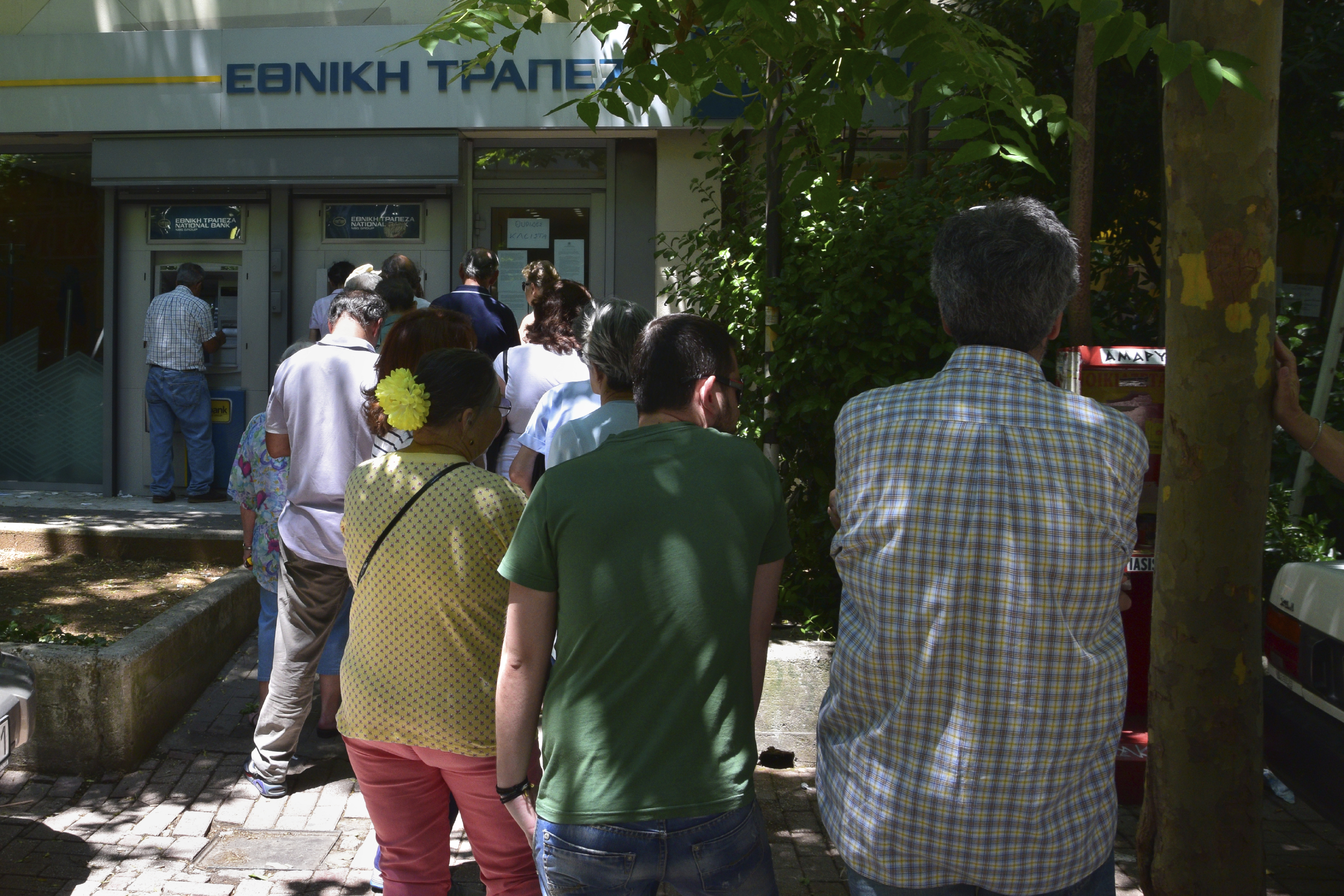
Tuesday, July 1st, Greece became the first developed nation to default on its debt. Since then, the economy has been thrown into turmoil. Banks have been closed and lengthy lines have formed at ATMs where residents are able to withdraw a maximum of 60 euro a day. Greek banks expect to run out of cash today or tomorrow. Sunday, the Greek people voted a resounding "No" to accepting more austerity measures recommended by the International Monetary Fund. Future hardship is a certainty.
The Great Recession hit the Greek economy hard. Its gross domestic product declined approximately 25% between 2008 and 2013! Last year it grew for the first time, but this current crisis will surely send it back into a recession. More than 20% of Greeks are pensioners. They have seen their monthly checks decrease from an average of 1,350€ in 2009 to 833€ according to the Labour Institute of the Greek Federation of Labour in this article from BBC News. Unemployment has increased to approximately 25%, with approximately half of the youth unable to find work.
There are many lessons we can learn from the Greek Crisis. Perhaps the most important is the need of having an electorate informed of basic economic theory to reduce the probability of future economic hardship.
Economic Growth Must Fuel Government Spending – The Greek government has been generous to its people. Over 20% of Greeks are pensioners. It has "generously" neglected collecting taxes from its wealthiest citizens and corporations. Matt O'Brien recently pointed out that in 2010 uncollected tax receipts as a percentage of total tax receipts equaled 89.5% in an article published July 5th in The Washington Post. Promises were made by politicians to attract voters. Mr. Tsipras promised fewer austerity measures when elected Prime Minister in January 2015. Mr. Tsipras isn't the first politician to make promises and spend beyond the government's means. Mounting debts between 2001 and 2012 provided the fuel for the current crisis. During this period Greece averaged a deficit equaling 7.8% of its GDP. This compares to 5.1% for the US and 1.5% for Germany. (See the World Bank). There was insufficient economic growth to pay for its programs.
Typically market forces weaken a country's currency when it is in a recession such as Greece is experiencing. This in turn generates exports and helps strengthen an economy. Governments may also print currency to add liquidity. In extreme cases a government may devalue its currency. None of these options are available to the Greek government since the euro is the European Union's currency, and the European Central Bank controls the money supply. Instead, borrowed money has provided the cash needed. The loans carry austerity measures that have been an enormous burden on the Greeks, including lower pension income, and higher taxes. These have slowed the economy, making the debt payments harder (if not impossible) to meet.
Education – Politicians make promises. These promises may be kept even if the country cannot afford them. They may be financed with debt. Eventually, enough debt has been secured that the economy cannot generate the income to make payments. Assume you are Greek. You must choose between two politicians. One has a great story, of how he will return prosperity with minimal hardship. More promises are made, but now the promises cannot be kept because the economics is invalid. The other candidate levels with the public with a message that a stiff price must be paid before returning to prosperity. Who will you vote for? Will you buy the great story and vote for the irresponsible candidate, or the more realistic candidate? I believe most people without an understanding of economics would vote for the good story, while those who understand the economics would recognize the illegitimacy of the first candidate and vote for the more realistic candidate even though hardship is required before prosperity.
Greek's debt has been building for decades. Promises have been made with borrowed money. Now it is time to pay, but Greek's leaders have few options. The Greek citizens will bear the consequences of their "No" vote. Returning to the drachma may spawn hyperinflation if the government chooses to print money. Continuing with the euro will not end economic hardships. The leaders of the European Commission, European Central Bank, and International Monetary Fund cannot just forgive the debt. If they did, other indebted nations would quickly hold their own referendums!
The Greek citizens are largely to blame for electing leaders who had great stories and provided entitlements with borrowed money The Greeks started their journey toward economic struggles when they voted for candidates who made promises they could only keep by incurring greater debt. Unfortunately, the Greeks are not alone. Many countries are headed in the same direction. Ignorance of basic economic principles plagues many countries.
Democracies thrive when the citizenry is well informed – but irresponsible leaders are more likely to be elected when the electorate is uneducated. Unfortunately, economic theory is not taught in most schools in the US. I welcome the recent increase in courses in financial literacy, but these courses do not address important issues on fiscal and monetary policy. Let's learn from the Greek Crisis that an informed electorate is the best insurance against financial hardship. Requiring that every high school graduate take a course in economic theory would be a great start.